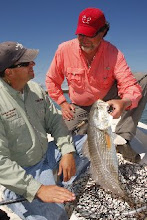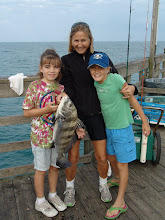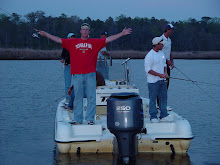CFRGNC
Link to the story landing page: http://www.northcarolinasportsman.com/details.php?id=2283
Numbers tell the tale of North Carolina’s saltwater gamefish decisionRecreational coastal fishing much more important to state economy than commercial fishing, stats show.
By Craig Holt
Recreational saltwater anglers far outnumber commercial fishermen in North Carolina, making them a powerful force for achieving gamefish status for redfish, spotted sea trout and stripers.
Two numbers jump out of the North Carolina Division of Marine Fisheries’ 2010 report on the state of the Tarheel State’s saltwater fisheries.The total commercial catch from the state’s coastal waters was slightly more than 72 million ponds, while the recreational catch was between 14 and 15 million pounds.
That’s everything: flounder, spotted sea trout, red drum, striper, spot, bluefish, bonito, eel, grouper, cobia, amberjack, grunt, hake, mullet, perch, pinfish, pompano, scup, porgie, pufferfish and shad. All of them.Some other numbers also jump off the page. In 2010, the state sold 5,179 commercial fishing licenses, of which 2,522 were bought by active commercial fishermen. The state also sold 296,175 recreational licenses to in-state purchasers and another 240,000 to out-of-staters, and fishermen who own lifetime licenses, bringing to around 800,000 the total number of people eligible to fish with hook-and-line in North Carolina coastal waters. So what’s the big deal about these numbers? If they are accurate, and NCDMF makes a big effort to ensure that they are, the average commercial netter caught 28,559 pounds of fish during 2010. Meanwhile, the recreational angler caught 18 pounds.
Well, one might ask, what’s the problem? It’s pretty simple. Recreational fishermen figured out a while back that the policies of the N.C. Marine Fisheries Commission – the appointed board that gives NCDMF staff members their marching orders – caters for the most part to the wishes of netters, even though recreational anglers outnumber netters by a factor o
 f 533 to 1. Over the past two years, recreational angler groups – including the Coastal Conservation Association of North Carolina, Coastal Fisheries Reform Group and the N.C. Wildlife Federation’s Camouflage Coalition – have tried through the state legislature to obtain gamefish status for three species of saltwater fish: red drum, spotted seatrout and striped bass.Two bills were drafted and derailed in the legislature, but their supporters rallied after the latest rebuff last year and asked legislators to revive the effort. The legislators, mostly Republicans, rolled the gamefish status proposal into an expansive review of the way North Carolina manages its saltwater resources, whether or not they’re allocated for their optimum use. Committee members such as co-chair Darrell McCormick (R-Forsyth) and co-chair Harry Brown (R-Onslow, Jones) have said the committee will conduct thorough studies of how saltwater agencies are managed in other states and will make decisions based on facts obtained by their staff researchers.
f 533 to 1. Over the past two years, recreational angler groups – including the Coastal Conservation Association of North Carolina, Coastal Fisheries Reform Group and the N.C. Wildlife Federation’s Camouflage Coalition – have tried through the state legislature to obtain gamefish status for three species of saltwater fish: red drum, spotted seatrout and striped bass.Two bills were drafted and derailed in the legislature, but their supporters rallied after the latest rebuff last year and asked legislators to revive the effort. The legislators, mostly Republicans, rolled the gamefish status proposal into an expansive review of the way North Carolina manages its saltwater resources, whether or not they’re allocated for their optimum use. Committee members such as co-chair Darrell McCormick (R-Forsyth) and co-chair Harry Brown (R-Onslow, Jones) have said the committee will conduct thorough studies of how saltwater agencies are managed in other states and will make decisions based on facts obtained by their staff researchers.If they check out the NCDMF’s 2010 Fisheries Bulletin, committee staff and members will discover:
• Commercial landings of ocean striped bass totaled 499,740 pounds, worth $1,220,542; spotted sea trout catches were 200,500 pounds, worth $350,349; and red drum totaled 231,760 pounds, worth $421,659.
These three species added together accounted for $1,992,550 in netting income.
• Striped bass totaled only 1.36 percent of all commercial fishing trips; red drum were less than 1 percent (.51) and spotted seatrout totaled 1.03 percent – a total of 2.9 percent.
The income these three species produced, $88,131,778, was 2.2 percent of all commercial fishing income.
• In 2010, only 250 commercial fishing participants statewide had landings of $2,000 or more from the sale of red drum, spotted seatrout, and striped bass combined. Of those, fewer than 30 had landings of $10,000 or more.
Dare
 and Carteret are the two counties with the largest commercial fishing operations in North Carolina, as measured by the number of commercial fishing participants and landings value. In 2009, Dare had commercial seafood landings of $21,930,359 with a total economic impact of approximately $40,000,000. On the other hand, in fiscal year 2009-2010, Dare County’s tourism-driven economy produced taxable sales of $1,136,418,490, indicating the total economic impact from commercial fishing represented only 3.5 percent. In 2009, Carteret had total commercial seafood landings of $9,542,039 for a total economic impact of approximately $18,000,000. In fiscal year 2009-2010, Carteret County’s tourism-driven economy produced taxable sales of $844,689,004, indicating that the total economic impact from commercial fishing represented only 2 percent of Carteret County’s economy.
and Carteret are the two counties with the largest commercial fishing operations in North Carolina, as measured by the number of commercial fishing participants and landings value. In 2009, Dare had commercial seafood landings of $21,930,359 with a total economic impact of approximately $40,000,000. On the other hand, in fiscal year 2009-2010, Dare County’s tourism-driven economy produced taxable sales of $1,136,418,490, indicating the total economic impact from commercial fishing represented only 3.5 percent. In 2009, Carteret had total commercial seafood landings of $9,542,039 for a total economic impact of approximately $18,000,000. In fiscal year 2009-2010, Carteret County’s tourism-driven economy produced taxable sales of $844,689,004, indicating that the total economic impact from commercial fishing represented only 2 percent of Carteret County’s economy.It’s the position of supporters of the gamefish bill that almost no commercial fishermen would lose a significant amount of their income by being forced to switch from red drum, speckled trout and stripers to other species. According to federal fisheries managers, the total economic impact from coastal recreational fishing trips and durable equipment expenditures in North Carolina in 2008 was approximately $2.3 billion and supported 22,000 jobs.
According to NCDMF, commercial fishing in 2010 accounted for 3,997 North Carolina jobs. Below is a summary of the number of registered voters (according to the N.C. Board of Elections), the number of recreational saltwater fishing license holders and commercial fishing license holders for Dare and Carteret counties in 2010.
Registered Recreational CommercialVoters license holders
• Carteret 47,831 11,274 (24%) 1,106 (2%)
• Dare 26,758 6,178 (23%) 827 (3%)
• Total 74,589 17,452 (23%) 1,933 (3%)
Any coastal politician who opposes some type of saltwater reform, particularly game-fish status for red drum, spotted seatrout and striped bass will be hanging a sign on his back that says, “Kick Me Out Of Office.”
For more up to date information on the Gamefish Bill stay tuned to the Coastal Fisheries Reform Group page!


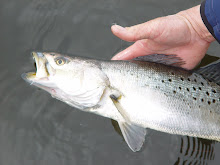



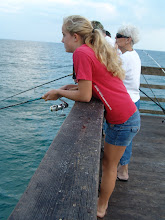

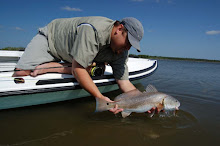.jpg)


